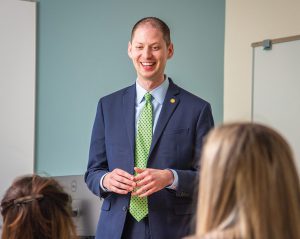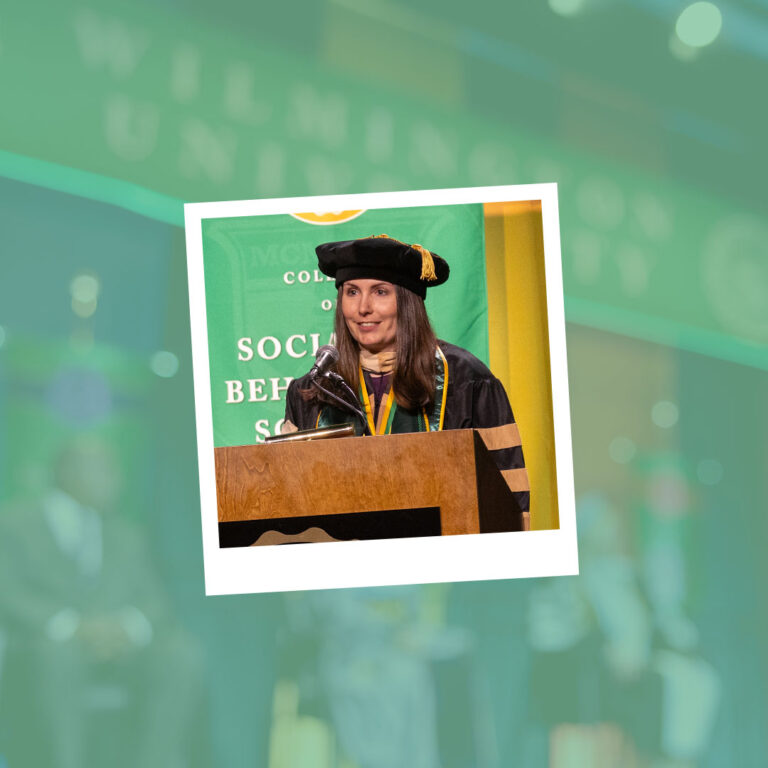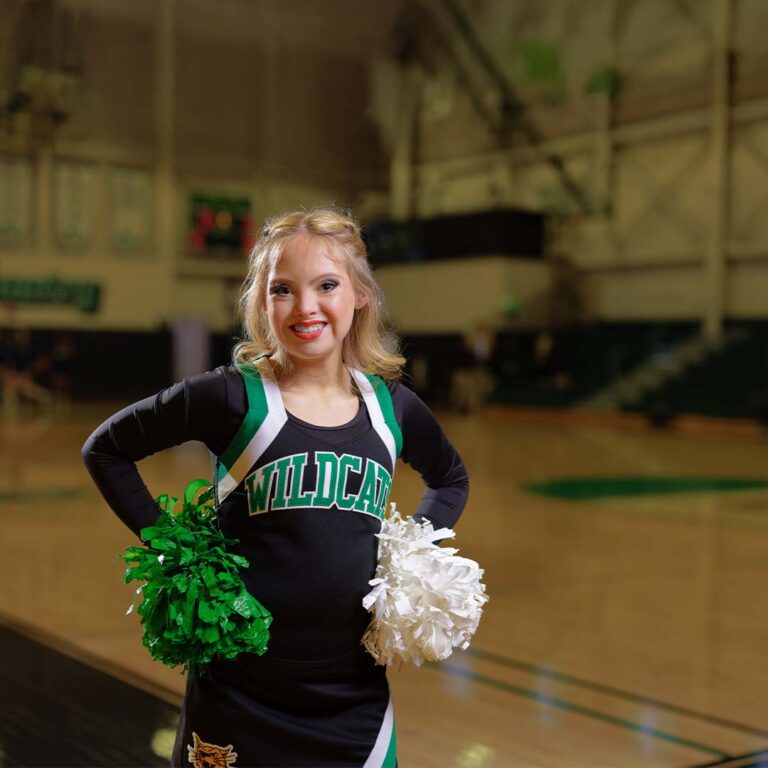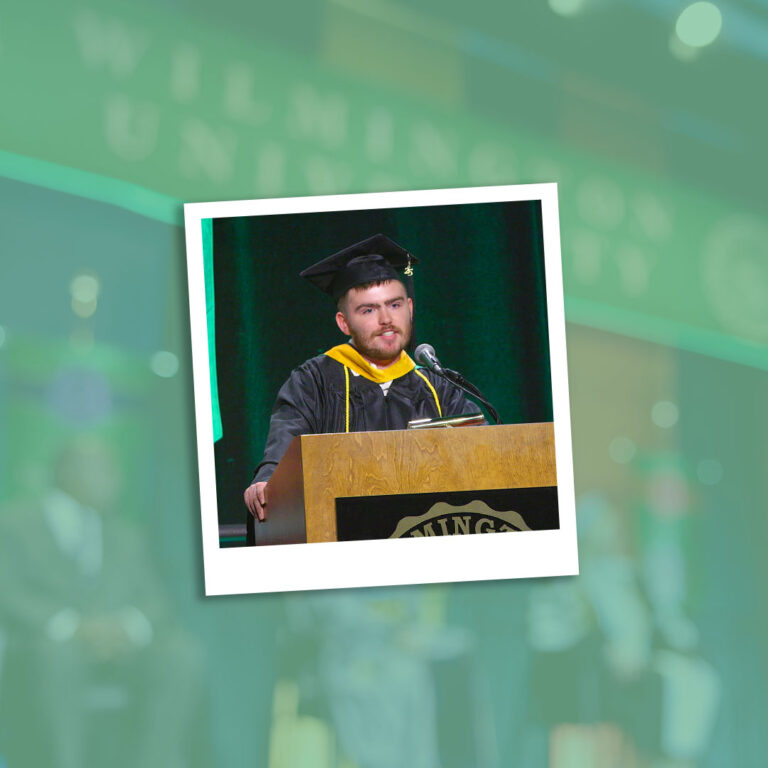More than a Title — or Titles: Dr. Aaron Sebach

A supportive partner, a color-coded calendar, and a flexible schedule allow Dr. Aaron Sebach to put as much passion into his practice as his teaching. And WilmU’s nursing practitioner students reap the rewards.

Dr. Aaron Sebach is chair of the Doctor of Nursing Practice Program (DNP) for Wilmington University’s College of Health Professions. And these are the credentials that follow his name: PhD, DNP, MBA, FNP-BC, NP-C, AGACNP-BC, CRNP, RN, CEN, CPEN, CDME, FHM.
A layperson wouldn’t understand the significance of these “letters,” but Dr. Denise Wells, dean of WilmU’s College of Health Professions, does.
“Aaron’s impressive list of post-nominal credentials indicates his investment in professional and practice excellence,” she says. “Earning terminal degrees and national certifications formally recognizes his specialty knowledge, skills and experience.”
Dr. Sebach is compassionate and steadfast in his pledge to protect human welfare. “These credentials represent my commitment to the profession and ensure that I am best prepared for my career,” he says.
Prepared he is, both at WilmU and at Peninsula Regional Medical Center in Salisbury, Maryland, where he maintains a practice as an acute care and family nurse practitioner working within the hospital’s adult inpatient medicine service.
His husband, Dr. Charles Dolan, is his best friend; his color-coded calendar is arguably his second. It helps him balance demanding professional responsibilities with a robust personal life. And while the couple has traveled the world, they have embraced their most inspiring journey yet.
A Teacher
Dr. Sebach’s first doctorate, a DNP in Leadership and Administration from Salisbury University, was for his patients. His second, a Ph.D. in Nursing Education from Indiana University of Pennsylvania, was for his students. Both terminal degrees — not to mention his bachelors, master’s, three post-master’s certificates, and MBA in Healthcare Administration — have fortified his career in several areas, including hospital medicine, perioperative medicine, primary care, and many others.
The College of Health Professions’ accrediting body, the Commission on Collegiate Nursing Education (CCNE), requires academic nurse practitioners to practice outside the University actively. Doing so aligns with WilmU’s mission to improve students’ competitiveness in the flourishing job market. Nursing is a growing field, which means that nursing students need an edge.
“Our dean allows for practice time each week to maintain the relevancy of our practice and to translate that knowledge to our students,” says Dr. Sebach, also a nationally board-certified family nurse practitioner and adult-gerontology acute care nurse practitioner “It speaks to our scholar-practitioner model here at the University as we’re actively working in the fields for which we prepare our students.”
In addition to chairing the DNP program, Dr. Sebach’s teaching responsibilities also involve clinical site visits for nurse practitioner (NP) students. He evaluates NP students in clinical settings that the college arranges. Further boosting his classroom effectiveness, Dr. Sebach has published and presented nationally on a variety of preoperative medicine topics. His list of publications, international and national presentations, and fellowships is voluminous.
“I find that our students are well-prepared and are really leading health care,” says Dr. Sebach. He primarily visits the Southern Delaware region, which fills a tremendous need for primary care providers. “It’s a dire need,” he adds. “A lot of physicians are not going into primary care as a specialty — other specialties pay more. That’s where NPs can fill that void and provide much-needed care to patients in rural communities such as Southern Delaware.”
A Calling
A native and current resident of Salisbury, Dr. Sebach was born in the same hospital where he practices. “It’s been full-circle for my career,” he says.
He knew at James M. Bennett High School that he wanted to do something in health care and his parents encouraged him to become a pharmacist. It would’ve been a great career, he says, but when he enrolled in a two-year heath occupations program at nearby Parkside High School’s Career and Technology Center and did a dual enrollment in academics and health care, he realized that pharmacology was not his calling. He completed the required clinical experiences and earned his nursing assistant license.
“I appreciated the human touch and the ability to speak to patients and really get to know them,” says Dr. Sebach. He changed course and headed to nursing school, earning both a BSN and MSN at Salisbury University. “It’s been one of the best decisions I’ve ever made.”
Not a lot of high school kids know definitively what field they want to pursue, but for Dr. Sebach, health care was in his blood. His aunt was a nurse leader — also at Peninsula — and he’d often go to work with her. There, the nursing units, monitor beeps, conversations between doctors, nurses and patients — the cacophony of a healing environment fueled his interest.
Dr. Sebach’s parents had a few reservations, mostly because there weren’t many men in nursing, and pharmacists made more money. That was true then, but things have changed. Salary-wise, pharmacists and NPs are probably on par at this point, says Dr. Sebach. Sans the stereotyping, men realize that nursing is a rewarding profession with high growth potential.
According to the U.S. Bureau of Labor Statistics, they’re right. Twelve percent of registered nurses are now men, which is up from 2.7 percent in 1970. Regardless of gender, statistics project that nursing will add more than 735,000 jobs by 2024, becoming the third largest job growth of any industry.
A Family
Dr. Sebach met his husband, Dr. Charles Dolan, in 2012, when both worked at a commercial ambulance service in Maryland. Dr. Sebach was the director of nursing, while Dr. Dolan led operations.

They planned to marry anyway but made it official in January to formally adopt a child. (The adoption process had been in the works for some time. The marriage certificate sealed the deal.)
“We did things backward: house, child, marriage,” says Dr. Sebach. Both were in health care and shared a passion for providing care. They wanted to have a family and build a legacy. Surrogacy and private adoptions were options, but the couple chose the local Social Services department’s foster-to-adopt program. The experience was eye-opening.
“There are so many children who’ve had terrible things happen to them,” says Dr. Sebach. “So many that need a loving family.”
The adoption process began in May of 2018 when the couple received an email requesting respite placement (temporary care) for Tony, an 11-year-old boy who was the oldest of five siblings. Their mother had physically and emotionally abused all of them.
“Tony had been parentified to take care of his siblings since his mother did not,” says Dr. Sebach, “So we started to do weekend respites just to give him a break and help him feel like a kid.”
Like many adopters, the couple initially hoped for a baby or toddler under 5, but they felt a connection to Tony. By December of 2018, Tony had been making regular weekend visits to their home. Social Services determined that it was no longer possible for him to return to his natural family since Tony’s mother had been convicted of child abuse, then incarcerated.
A year later, in July, Tony was placed with Drs. Sebach and Dolan full-time and adopted officially on March 12, 2020. His siblings found homes as well: the two sisters in one adoptive home; the two brothers each have new families.
“They all live local to us,” says Dr. Sebach, “so the children see each other a few times a month. All the adoptive families have committed to the children staying connected. That was the goal.”
It’s been an exciting time, says Dr. Sebach. “Certainly a lot of changes. I have been most appreciative of the flexibility the University offers to have the time to make sure all of Tony’s needs are met.”
A Global View
The travel bug bit when Dr. Sebach’s friend, an emergency and part-time cruise ship nurse, told him about Holland America Line. “Charles and I booked a cruise to the Caribbean one Easter and really enjoyed that.” They’ve voyaged to Hong Kong, Spain, Greece, Alaska, and this summer, from Rome to Copenhagen.

Now, the family of three will sail the high seas together, since Tony’s official adoption allows him to travel internationally. He’s already taken a few trips with his new parents, including a weeklong escape to San Diego for Christmas.
Travel has been an academic pursuit as well for Dr. Sebach. He studied abroad in Tanzania while earning his bachelor’s and taught there about HIV and AIDS. For his master’s, he visited China to learn about traditional Chinese medicine, which, he says, “is an augment to Western medicine.”
Salisbury didn’t require studying abroad; Dr. Sebach wanted to explore a universal view of health care. “Both trips inspired my practice in different ways,” he says. “The trip to Tanzania taught me that you can provide a lot of care with limited resources, and how to best provide care to rural populations.”
In China, he learned to focus on the whole patient, not just to prescribe medications. “I think that’s one thing that distinguishes NPs from physicians. We are good at being our patients’ advocates and really understanding their needs from a holistic perspective.”
In several states, including Delaware and Maryland, NPs have independent practice authority and are hanging their own shingles for primary care and specialty offices. Data that NPs have provided over time show that outcomes are identical to physicians in terms of managing and diagnosing chronic and acute conditions.
The American Association of Nurse Practitioners reports that in the past two years, “the numbers of NPs have doubled, and today, more than 270,000 practice across the U.S.” The increase can be attributed to the confidence patients and health care systems place in NP-provided care.
In 2018, more than 87 percent of of NPs were prepared in primary care programs, while 8 percent of physicians entered a primary care residency. Patients elected to see an NP for their care in more than 1 billion visits.
A Competitive Advantage
WilmU’s DNP program, which was reaccredited last month by CCNE and is offered in two formats, online and in a weekend intensive format at Jack P. Varsalona Hall at Wilmington University Brandywine, provides advanced practice nurses and nurse leaders with integrated clinical and leadership skills. It also encourages them to go way beyond the data.
“It’s about taking a step back, examining the available evidence, and translating that knowledge to practice,” says Dr. Sebach. “DNP-prepared nurses decrease the knowledge-practice gap. They are experts in leading practice changes across the continuum of care for patients, families, health care providers and health systems.”
For advanced practice nurses and nurse leaders who have a passion for providing high-quality care and improving health outcomes, says Dr. Sebach, “they should pursue a DNP degree. They should proceed with that goal and not let their gender be a barrier for them.”
It certainly hasn’t for Dr. Sebach or many of his colleagues. “If you look at men in nursing,” he says, “they seem to excel in their careers and often move into management positions or advanced practice roles like NPs or nurse anesthetists.”
Future advanced practice nurses and nurse leaders need strong role models and mentors, Dr. Sebach says. The health care field is wide open. America is aging, and the older we get, the more nurses we’ll need.
Learn more about WilmU’s DNP program here.



